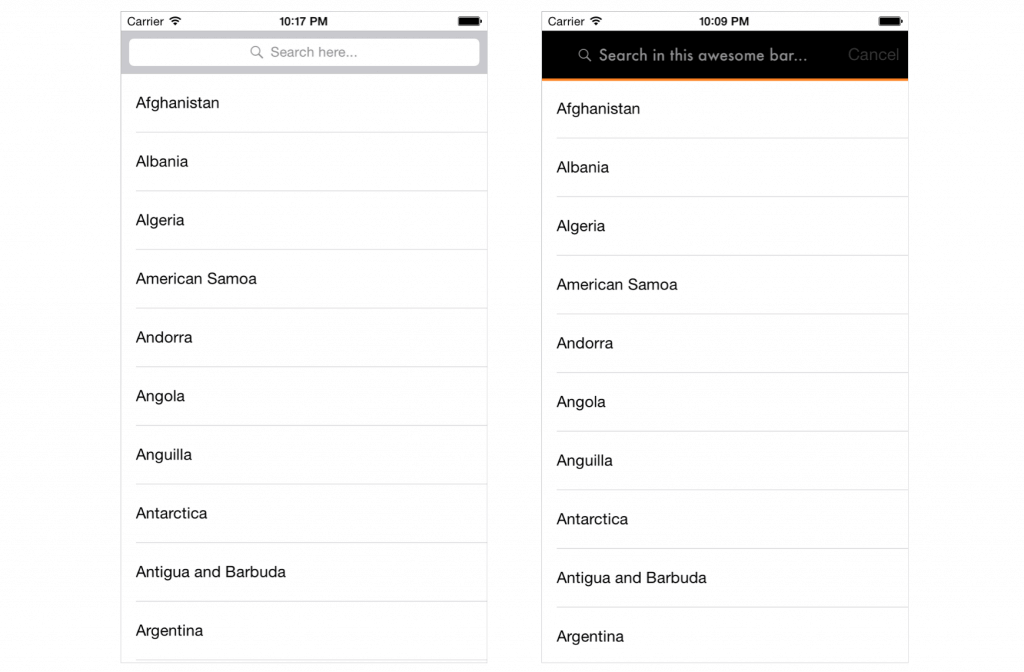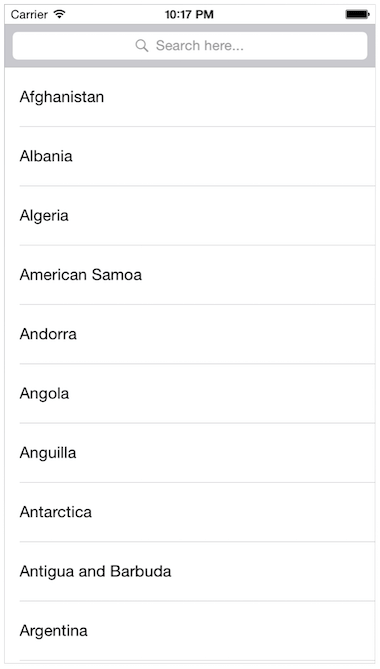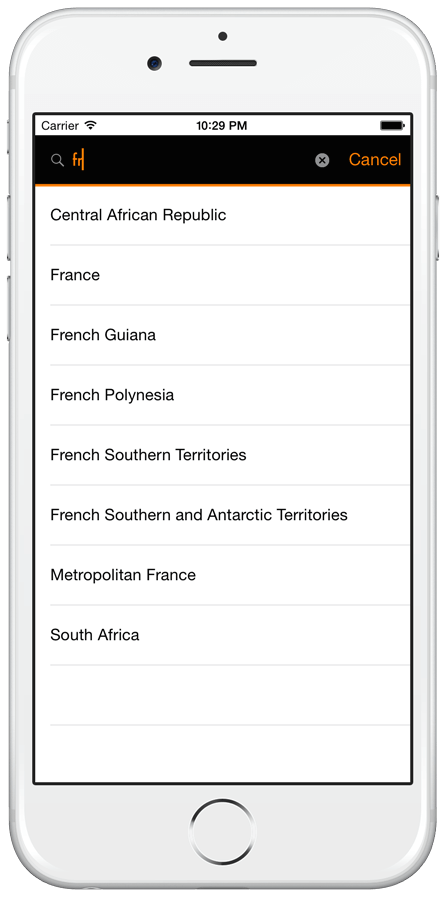翻译了一篇appcoda的文章,介绍如何自定义SearchBar的文章
原文链接: http://www.appcoda.com/custom-search-bar-tutorial/
app里面经常需要展示一些搜索的数据显示到tableview上。不幸的是,大部分开发者使用原生的控件。在iOS8里,苹果提供了一个特殊的控件 UISearchDisplayController 。这个控件结合了 UISeachBar ,很轻松的添加搜索的功能。不过,现在已经成为了历史。
UISearchController 在iOS8里面已经取代了 UISearchDisplayController . 尽管这虽然改变,但是在IB里面没有继承可视化控件,它必须用代码去初始化配置,不过非常简单。

除了上面所说的,有一个有趣的关于tableview datasource搜索的地方。iOS提供了一个searchbar预设的外观,这个bar适用于大多数情况。 然而,当UI需要高度自定义,这个searchbar看起来与我们的不是那么搭。在这种情况下,我们的searchbar必须适当的定制。
在这个教程里面,会展示 UISearchController 在iOS8里面是如何搜索和过滤数据的,使用默认的searchbar。
接着如何重写默认的searchbar的外观,实现自定义。所以我们设置了 UISearchController 和 UISearchBar 的子类,里面的代码通俗易懂,并且控件非常通用,可以复用。
Demo App Overview
我们将实现下面两个界面

第一张在 UISearchController 使用默认 searchbar 。第二张是自定义的searchbar.
首先下载工程的: Demo
加载和展示数据
首先加载 countries.txt 文件里面的数据,然后我们再通过列表的方式展示。
打开 ViewController.swift 文件,声明下面的属性
var dataArray = [String]() //countries.txt文件里面的内容,tableview展示的数据
var filteredArray = [String]()//搜索匹配的内容
var shouldShowSearchResults = false //控制是否需要展示数据
加载tableView所需要的数据数据
func loadListOfCountries() {
// Specify the path to the countries list file.
let pathToFile = NSBundle.mainBundle().pathForResource("countries", ofType: "txt")
if let path = pathToFile {
// Load the file contents as a string.
let countriesString = String(contentsOfFile: path, encoding: NSUTF8StringEncoding, error: nil)!
// Append the countries from the string to the dataArray array by breaking them using the line change character.
dataArray = countriesString.componentsSeparatedByString("/n")
// Reload the tableview.
tblSearchResults.reloadData()
}
}
在 viewDidLoad() 里面调用它
override func viewDidLoad() {
...
loadListOfCountries()
}
更新数据,返回dataArray
func tableView(tableView: UITableView, numberOfRowsInSection section: Int) -> Int {
if shouldShowSearchResults {
return filteredArray.count
}
else {
return dataArray.count
}
}
确定cell需要展示的内容
func tableView(tableView: UITableView, cellForRowAtIndexPath indexPath: NSIndexPath) -> UITableViewCell {
var cell = tableView.dequeueReusableCellWithIdentifier("idCell", forIndexPath: indexPath) as! UITableViewCell
if shouldShowSearchResults {
cell.textLabel?.text = filteredArray[indexPath.row]
}
else {
cell.textLabel?.text = dataArray[indexPath.row]
}
return cell
}
下面我们来配置search controller 显示默认的search bar
配置UISearchController
首先在 ViewController.swift 里面声明一个searchController
var searchController: UISearchController!
接下来我们来实现 configureSearchController() 方法。
func configureSearchController() {
// Initialize and perform a minimum configuration to the search controller.
searchController = UISearchController(searchResultsController: nil)
searchController.searchResultsUpdater = self
searchController.dimsBackgroundDuringPresentation = false
searchController.searchBar.placeholder = "Search here..."
searchController.searchBar.delegate = self
searchController.searchBar.sizeToFit()
// Place the search bar view to the tableview headerview.
tblSearchResults.tableHeaderView = searchController.searchBar
}
这里有一个重要的知识点:在我们的demo中tableview显示搜索结果是在一个已经存在的controller中,然而还有一种情况是把搜索结果展示到另外一个ViewController中,所以需要知道把搜索结果展示到哪里. 当初始化的时候传 nil ,search controller 知道viewController已经存在,搜索数据回调到给这个viewController. 另外一种情况就是传指定的controller。
在搜索的时候有两种方法更新我们的tableview,第一种是通过searchbar的delegate。第二种是在delegate对象的Viewcontroller里面设置 searchResultsUpdater 属性(bool),稍后会在自定义控制器中看见这个是如何使用的。
在这里我们通过实现 UISearchResultsUpdating 协议。这个是iOS8才有的.
func updateSearchResultsForSearchController(searchController: UISearchController) {
let searchString = searchController.searchBar.text
// Filter the data array and get only those countries that match the search text.
filteredArray = dataArray.filter({ (country) -> Bool in
let countryText: NSString = country
return (countryText.rangeOfString(searchString, options: NSStringCompareOptions.CaseInsensitiveSearch).location) != NSNotFound
})
// Reload the tableview.
tblSearchResults.reloadData()
}
这里用了 searchString 保存关键字,然后用filter过滤
最后实现 UISearchbarDelegate
func searchBarTextDidBeginEditing(searchBar: UISearchBar) {
shouldShowSearchResults = true
tblSearchResults.reloadData()
}
func searchBarCancelButtonClicked(searchBar: UISearchBar) {
shouldShowSearchResults = false
tblSearchResults.reloadData()
}
func searchBarSearchButtonClicked(searchBar: UISearchBar) {
if !shouldShowSearchResults {
shouldShowSearchResults = true
tblSearchResults.reloadData()
}
searchController.searchBar.resignFirstResponder()
}
最后运行app

自定义Searchbar
创建一个UISearchBar的子类 CustomSearchBar .在这里,我们会创建一个自定义的初始化方法,传递 frame , font , text color 等参数,在此之前,先定义两个属性
var preferredFont: UIFont!
var preferredTextColor: UIColor!
创建一个初始化方法,并且改变了searchBar的类型。设置了 translucent 属性,背景是不透明的。
init(frame: CGRect, font: UIFont, textColor: UIColor) {
super.init(frame: frame)
self.frame = frame
preferredFont = font
preferredTextColor = textColor
searchBarStyle = UISearchBarStyle.Prominent
translucent = false
}
提示: searchbar 并不是单一的控件,textfield只是其中的一部分。另外searchbar有一个UIView作为子类,这个view里面包含textfield和一个backgroundView。 可以打印一下就知道了
print(searchController.searchBar.subviews[0].subviews)
将会输出

我测试的时候输出的是这样的:layer那里有一个null?
[<UISearchBarBackground: 0x7fb771e8e7f0; frame = (0 0; 600 44); opaque = NO; userInteractionEnabled = NO; layer = <CALayer: 0x7fb771e83cf0>> - (null), <UISearchBarTextField: 0x7fb771e97b70; frame = (0 0; 0 0); text = ''; clipsToBounds = YES; opaque = NO; layer = <CALayer: 0x7fb771e969f0>>]
为了找到 searField ,写一个找到子类的方法
func indexOfSearchFieldInSubviews() -> Int! {
var index: Int!
let searchBarView = subviews[0] as! UIView
for var i=0; i<searchBarView.subviews.count; ++i {
if searchBarView.subviews[i].isKindOfClass(UITextField) {
index = i
break
}
}
return index
}
接下来实现 drawRect 方法。 修改了textfield的大小,在底部添加了一条线
override func drawRect(rect: CGRect) {
if let index = indexOfSearchFieldInSubviews() {
let searchField : UITextField = (subviews[0]).subviews[index] as! UITextField
searchField.frame = CGRectMake(5.0, 5.0, frame.size.width - 10.0, frame.size.height - 10.0)
searchField.font = preferredFont
searchField.textColor = preferredTextColor
searchField.backgroundColor = barTintColor
}
let startPoint = CGPointMake(0.0, frame.size.height)
let endPoint = CGPointMake(frame.size.width, frame.size.height)
let path = UIBezierPath()
path.moveToPoint(startPoint)
path.addLineToPoint(endPoint)
let shapeLayer = CAShapeLayer()
shapeLayer.path = path.CGPath
shapeLayer.strokeColor = preferredTextColor.CGColor
shapeLayer.lineWidth = 2.5
layer.addSublayer(shapeLayer);
super.drawRect(rect)
}
自定义SearchController
创建一个子类 CustomSearchController ,并且在里面增加 CustomSearchBar 的引用
var customSearchBar: CustomSearchBar!
自定义初始化方法
init(searchResultsController: UIViewController!, searchBarFrame: CGRect, searchBarFont: UIFont, searchBarTextColor: UIColor, searchBarTintColor: UIColor) {
super.init(searchResultsController: searchResultsController)
configureSearchBar(searchBarFrame, font: searchBarFont, textColor: searchBarTextColor, bgColor: searchBarTintColor)
}
需要添加两个方法
override init(nibName nibNameOrNil: String?, bundle nibBundleOrNil: NSBundle?) {
super.init(nibName: nibNameOrNil, bundle: nibBundleOrNil)
}
required init(coder aDecoder: NSCoder) {
super.init(coder: aDecoder)
}
configureSearchBar() 方法
func configureSearchBar(frame: CGRect, font: UIFont, textColor: UIColor, bgColor: UIColor) {
customSearchBar = CustomSearchBar(frame: frame, font: font , textColor: textColor)
customSearchBar.barTintColor = bgColor
customSearchBar.tintColor = textColor
customSearchBar.showsBookmarkButton = false
customSearchBar.showsCancelButton = true
}
在 viewController 里面初始化
func configureCustomSearchController() {
customSearchController = CustomSearchController(searchResultsController: self, searchBarFrame: CGRectMake(0.0, 0.0, tblSearchResults.frame.size.width, 50.0), searchBarFont: UIFont(name: "Futura", size: 16.0)!, searchBarTextColor: UIColor.orangeColor(), searchBarTintColor: UIColor.blackColor())
customSearchController.customSearchBar.placeholder = "Search in this awesome bar..."
tblSearchResults.tableHeaderView = customSearchController.customSearchBar
}
最后实现的效果

完整的demo下载
参考demo











![[HBLOG]公众号](https://www.liuhaihua.cn/img/qrcode_gzh.jpg)

